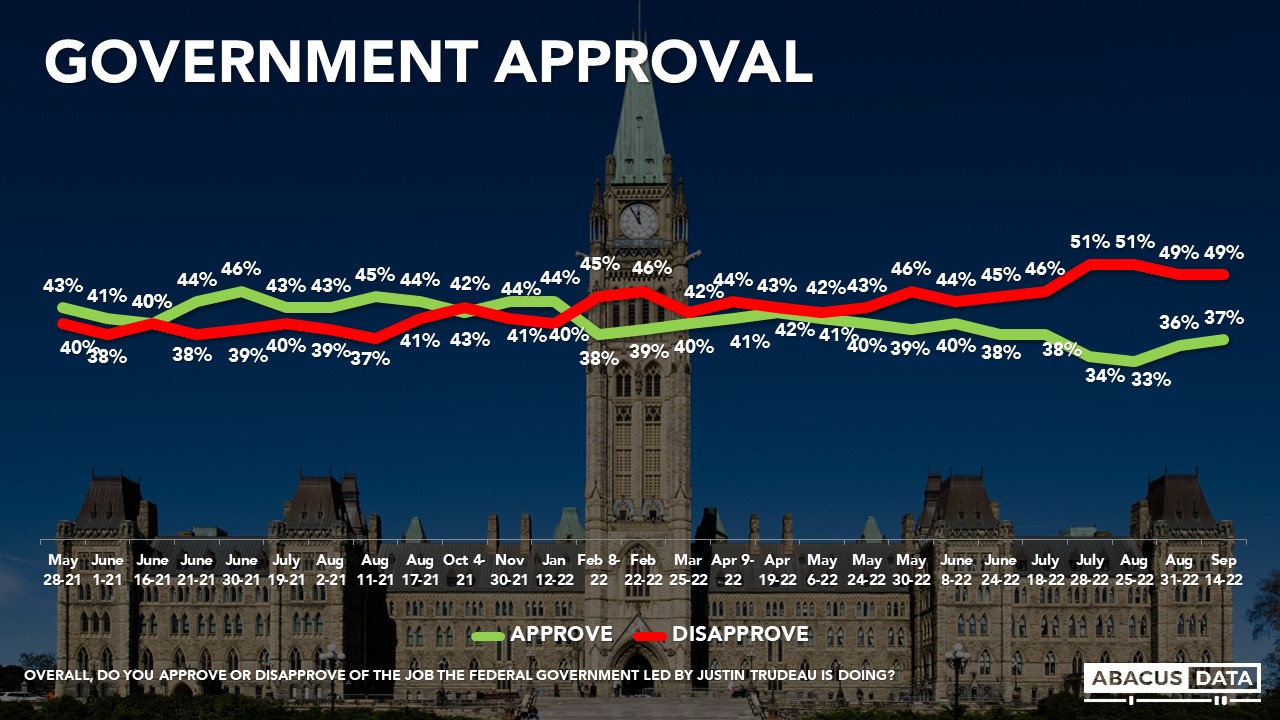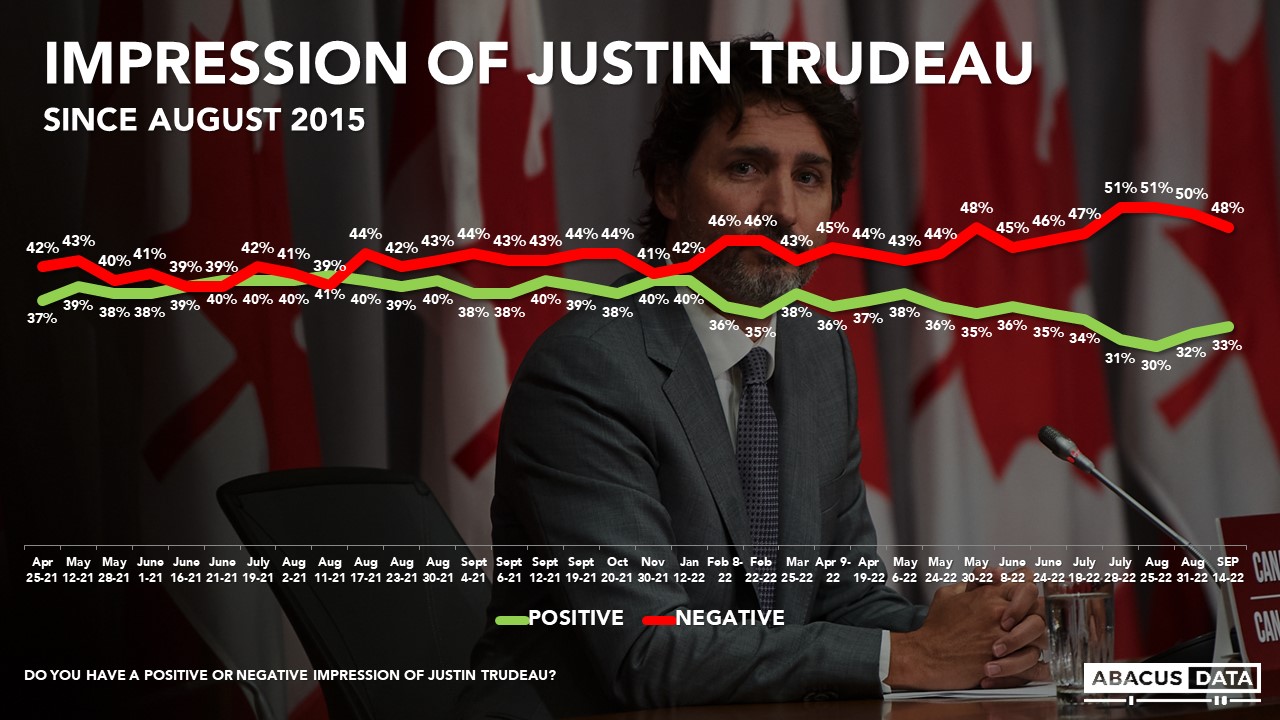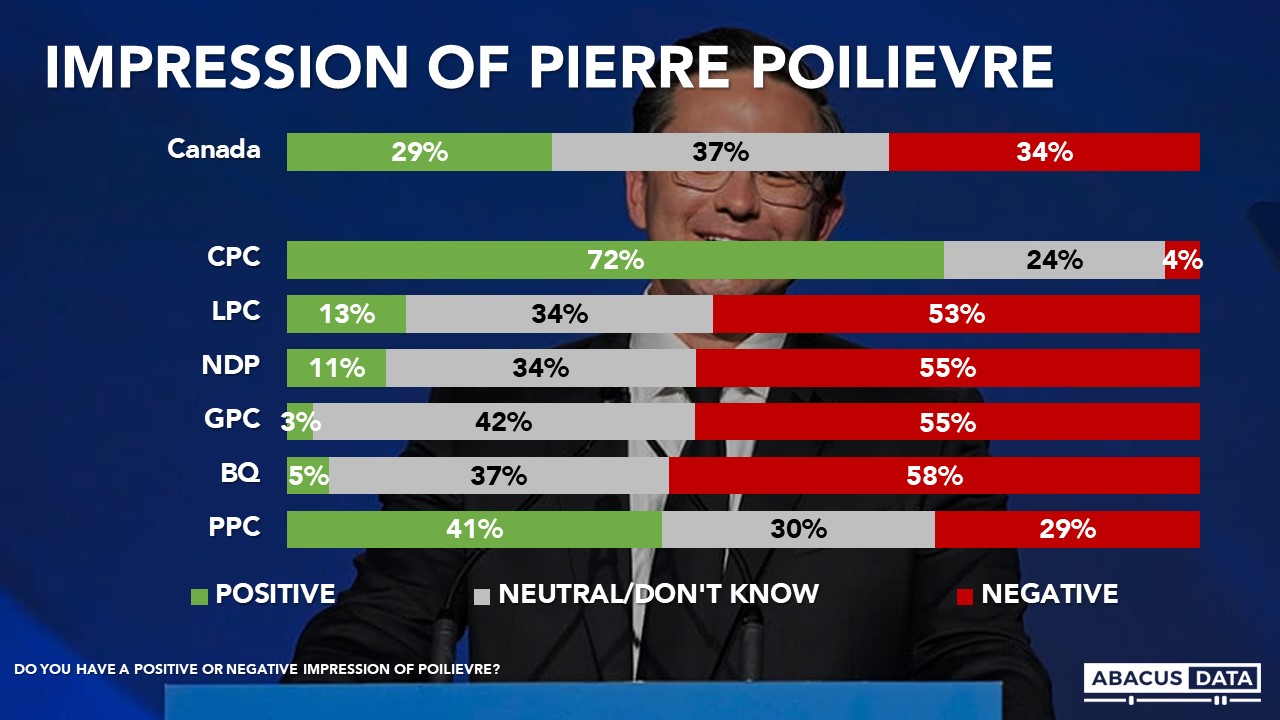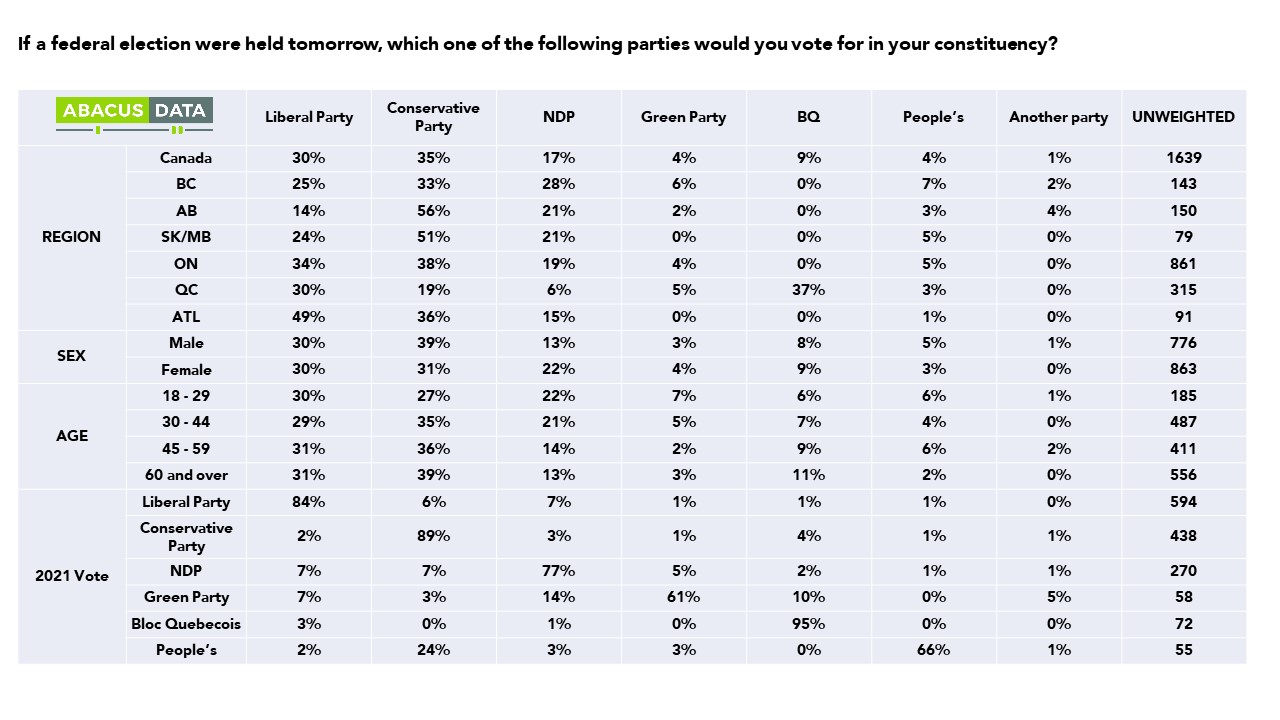After One Week: The Conservatives lead by 5 over the Liberals
September 19, 2022
We just completed a national survey of 1,990 Canadian adults from September 11 to 14, 2022.
VOTE INTENTION
If an election were held today, 35% would vote for the Conservative Party, 30% for the Liberal Party, 17% for the NDP and 9% for the BQ. All the interviews for this wave of results were completed after the results of the Conservative leadership race were announced last Saturday evening. This is the third survey in four we have completed in which the Conservatives have a 5-point lead over the Liberals.
The results indicate a three way race in BC with the Conservatives ahead, a slight lead for the Conservatives in Ontario, and the Liberals falling behind BQ in Quebec. The Liberals have a wide lead in Atlantic Canada and the Conservatives have a huge advantage in the Prairies.
SATISFACTION WITH FEDERAL GOVERNMENT UNCHANGED
Today, 37% are satisfied, and 49% are dissatisfied with the performance of the federal government, a one-point or statistically insignificant change from last wave.
FEELINGS ABOUT THE PRIME MINISTER ARE STABLE
Public feelings about Prime Minister Trudeau show no further decline and small gains over the last few waves. The shift is small enough to be cautious not to over-interpret. The Prime Minister’s negatives stand at 48% – down from a peak of 51% a few weeks ago.
JAGMEET SINGH’S APPROVAL RATING HAS IMPROVED SLIGHTLY
For the last couple of years, Jagmeet Singh has been the most popular of the federal leaders, at one time his net rating was +21 (46% positive/25% negative). Since then, his positives have slid and his negatives have risen. This latest result shows no further deterioration and mild improvement.
PIERRE POILIEVRE: POSITIVES AND NEGATIVES JUMP 7 POINTS
There’s been a big jump in the number of people who have an opinion about Pierre Poilievre, and the results are mixed for the Conservative leader. His negatives rose by 7 points and his positives rose by 7 points as well. The plurality (37%) remain on the fence about Mr. Poilievre.
Regionally, Mr. Poilievre’s positives are highest in Alberta (43%) and lowest in Quebec (21%). His negatives are also highest in Quebec (47%) and lowest in Alberta and Atlantic Canada.
Among current party supporters, Mr. Poilevre has a net +68 among his own party supporters and a +12 among People’s Party supporters. But among Liberal, NDP, Green, and BQ supporters, a majority have a negative view with very few having a positive impression. His net favourables among Liberal supporters is -40, -44 among NDP supporters, -52 among Green supporters, and -33 among BQ supporters.
UPSHOT
 According to Bruce Anderson: “The election of Pierre Poilievre to lead the Conservatives was neither the boost of enthusiasm the Conservative Party might have hoped for nor was it good news for their rivals in the Liberal Party. The interesting thing to watch is whether the ballot question over the next year or two will be about Mr. Trudeau, or about Mr. Poilievre. The Conservatives will see good news in the rise in positive feelings towards their new leader but some anxiety in a same-sized rise in negative opinion, and particularly negative opinions in the province of Quebec. The handling of his relationship with Jean Charest, Alain Rayes, and others in the Quebec caucus represents a weak start in a province where Mr. Poilievre must hope to win more ridings, not lose seats.”
According to Bruce Anderson: “The election of Pierre Poilievre to lead the Conservatives was neither the boost of enthusiasm the Conservative Party might have hoped for nor was it good news for their rivals in the Liberal Party. The interesting thing to watch is whether the ballot question over the next year or two will be about Mr. Trudeau, or about Mr. Poilievre. The Conservatives will see good news in the rise in positive feelings towards their new leader but some anxiety in a same-sized rise in negative opinion, and particularly negative opinions in the province of Quebec. The handling of his relationship with Jean Charest, Alain Rayes, and others in the Quebec caucus represents a weak start in a province where Mr. Poilievre must hope to win more ridings, not lose seats.”
 According to David Coletto: “Mr. Poilievre and the Conservatives can take solace in that he starts his time as Conservative leader with a solid national lead. But his initial introduction to Canadians has been quite mixed. Most striking is the level of polarization in views towards Mr. Poilievre already. The data suggests he’s already the most polarizing leader at the federal level – more so than even Mr. Trudeau. Mr. Poilievre is well-liked among Conservatives and some People’s Party supporters but finds few admirers in among other party supporters. This will make expanding the Conservative Party’s appeal challenging and something to watch over the next few weeks.
According to David Coletto: “Mr. Poilievre and the Conservatives can take solace in that he starts his time as Conservative leader with a solid national lead. But his initial introduction to Canadians has been quite mixed. Most striking is the level of polarization in views towards Mr. Poilievre already. The data suggests he’s already the most polarizing leader at the federal level – more so than even Mr. Trudeau. Mr. Poilievre is well-liked among Conservatives and some People’s Party supporters but finds few admirers in among other party supporters. This will make expanding the Conservative Party’s appeal challenging and something to watch over the next few weeks.
METHODOLOGY
The survey was conducted with 1,990 Canadian adults from September 11 to 14, 2022. A random sample of panelists were invited to complete the survey from a set of partner panels based on the Lucid exchange platform. These partners are typically double opt-in survey panels, blended to manage out potential skews in the data from a single source.
The margin of error for a comparable probability-based random sample of the same size is +/- 2.2% 19 times out of 20.
The data were weighted according to census data to ensure that the sample matched Canada’s population according to age, gender, educational attainment, and region. Totals may not add up to 100 due to rounding.
This survey was paid for by Abacus Data Inc.
Abacus Data follows the CRIC Public Opinion Research Standards and Disclosure Requirements that can be found here: https://canadianresearchinsightscouncil.ca/standards/
ABOUT ABACUS DATA
We are the only research and strategy firm that helps organizations respond to the disruptive risks and opportunities in a world where demographics and technology are changing more quickly than ever.
We are an innovative, fast-growing public opinion and marketing research consultancy. We use the latest technology, sound science, and deep experience to generate top-flight research-based advice to our clients. We offer global research capacity with a strong focus on customer service, attention to detail, and exceptional value.
We were one of the most accurate pollsters conducting research during the 2021 Canadian election following up on our outstanding record in 2019.
Contact us with any questions.
Find out more about how we can help your organization by downloading our corporate profile and service offering.













